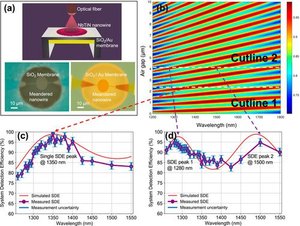ImPhys paper most downloaded in APL photonics 2021
Our paper: "Detecting telecom single photons with (99.5+0.5⎯2.07)% system detection efficiency and high time resolution" is the most downloaded paper in APL photonics in 2021. The most read Editor’s Picks from 2021 have been downloaded over 1,500+ times since publishing.

Detecting telecom single photons with (99.5+0.5⎯2.07)99.5−2.07+0.5% system detection efficiency and high time resolution
J. Chang, J. W. N. Los, J. O. Tenorio-Pearl, N. Noordzij, R. Gourgues, A. Guardiani, J. R. Zichi, S. F. Pereira, H. P. Urbach, V. Zwiller, S. N. Dorenbos, and I. Esmaeil Zadeh
Abstract:
Single photon detectors are indispensable tools in optics, from fundamental measurements to quantum information processing. The ability of superconducting nanowire single photon detectors (SNSPDs) to detect single photons with unprecedented efficiency, short dead time, and high time resolution over a large frequency range enabled major advances in quantum optics. However, combining near-unity system detection efficiency (SDE) with high timing performance remains an outstanding challenge. In this work, we fabricated novel SNSPDs on membranes with (99.5+0.5⎯2.07)99.5−2.07+0.5% SDE at 1350 nm with 32 ps timing jitter (using a room-temperature amplifier), and other detectors in the same batch showed 94%–98% SDE at 1260–1625 nm with 15–26 ps timing jitter (using cryogenic amplifiers). The SiO2/Au membrane enables broadband absorption in small SNSPDs, offering high detection efficiency in combination with high timing performance. With low-noise cryogenic amplifiers operated in the same cryostat, our efficient detectors reach a timing jitter in the range of 15–26 ps. We discuss the prime challenges in optical design, device fabrication, and accurate and reliable detection efficiency measurements to achieve high performance single photon detection. As a result, the fast developing fields of quantum information science, quantum metrology, infrared imaging, and quantum networks will greatly benefit from this far-reaching quantum detection technology.
APL Photonics 6, 036114 (2021); https://doi.org/10.1063/5.0039772